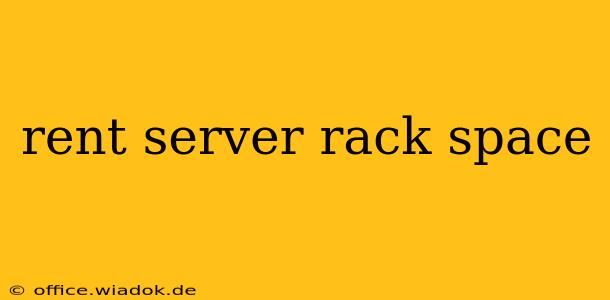Renting server rack space, also known as colocation, offers businesses a powerful way to house their IT infrastructure. But with numerous providers and options available, choosing the right solution can feel overwhelming. This comprehensive guide will walk you through the essential factors to consider when renting server rack space, ensuring you make an informed decision that meets your specific needs and budget.
Understanding Server Rack Space Colocation
Colocation allows you to place your servers and networking equipment within a data center owned and operated by a third-party provider. Instead of managing your own physical infrastructure, you benefit from the provider's expertise in areas like:
- Power and Cooling: Redundant power supplies and advanced cooling systems ensure uptime and protect your equipment from overheating.
- Security: Data centers typically employ robust security measures, including physical access controls, surveillance, and fire suppression systems.
- Network Connectivity: High-bandwidth internet connections and diverse network providers are readily available, providing reliable connectivity and redundancy.
- 24/7 Monitoring: Professional staff continuously monitor the data center environment, proactively addressing potential issues.
Key Factors to Consider When Renting Server Rack Space
Choosing the right colocation provider requires careful consideration of several key factors:
1. Location and Network Connectivity:
- Proximity to your users: Reducing latency is crucial for applications requiring low response times. Choosing a data center closer to your target audience improves performance and user experience.
- Network diversity: Selecting a provider offering diverse network connections from multiple carriers ensures redundancy and protects against outages. Consider peering relationships and available bandwidth.
2. Rack Space Specifications and Pricing:
- Rack Unit (U) size: Understand the physical dimensions of the rack space available. Ensure it accommodates your equipment.
- Power capacity (kW): Determine the power requirements of your servers and network devices. Ensure the rack space can handle the load.
- Pricing model: Colocation providers typically offer various pricing models. Understand the costs involved, including rack space rental, power consumption, bandwidth, and any additional services.
3. Data Center Security and Uptime:
- Physical security: Inquire about security measures like access control systems, surveillance cameras, and security personnel.
- Environmental controls: Verify the presence of redundant power supplies, HVAC systems, and fire suppression systems.
- Uptime SLA (Service Level Agreement): A strong SLA guarantees minimal downtime and ensures the provider's commitment to reliability. Look for providers with a 99.999% or higher uptime guarantee.
4. Services and Support:
- Bandwidth and connectivity options: Assess the bandwidth options available and choose a plan that meets your current and future needs.
- Technical support: 24/7 technical support is crucial for resolving any issues promptly. Understand the provider's support offerings and response times.
- Remote hands support: Consider whether you require remote hands support, where data center technicians can physically access your equipment for maintenance or troubleshooting.
Choosing the Right Colocation Provider: A Step-by-Step Approach
- Assess your needs: Determine your server requirements, power needs, bandwidth requirements, and budget.
- Research providers: Compare different colocation providers based on location, pricing, security, and support. Read reviews and testimonials.
- Request quotes: Contact several providers and request detailed quotes outlining all costs involved.
- Visit data centers (if possible): A physical visit allows you to assess the facility's security and infrastructure firsthand.
- Negotiate terms: Carefully review the contract before signing, ensuring it aligns with your requirements.
Renting server rack space is a significant decision that can impact your business's IT infrastructure and operational efficiency. By carefully considering these factors and following a structured approach, you can choose a colocation solution that delivers reliability, security, and scalability for years to come.

